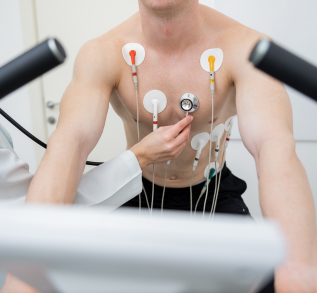
What Is a Stress Test on the Heart?
A heart stress test, sometimes called an exercise stress test or cardiac stress test, is a common way to see how your heart performs when it has to work harder. At West Kent Cardiology Partnership, we use stress tests to assess heart function, identify circulation problems, and guide treatment for people with chest pain, shortness of breath, or suspected coronary artery disease.
What Is the Purpose of a Heart Stress Test?
The main goal of a heart stress test is to check how well blood and oxygen flow to your heart when it is working at an increased rate. Many heart conditions do not show clear signs when you are resting, so this test helps reveal issues that might only appear during physical activity.
A stress test can help doctors:
- Detect coronary artery disease (CAD), where blood flow to the heart is reduced
- Determine safe levels of exercise for heart patients
- Assess the effectiveness of treatment or medication
- Guide recovery plans after a heart attack or surgery
It is a simple but effective way to measure how well your heart copes under controlled stress.
How Does a Heart Stress Test Work?
A standard stress test is usually done on a treadmill or stationary bike. You start by walking or pedalling slowly, and the intensity increases gradually. Throughout the test, your heart rhythm, blood pressure, and breathing are closely monitored using sensors attached to your chest.
If you are unable to exercise, you may have a pharmacological stress test instead. In this case, medication is used to make your heart work harder, mimicking the effects of exercise. The test still provides the same valuable information without requiring physical activity.
What Happens During the Test?
A typical heart stress test follows these steps:
- Preparation: Small sticky patches (electrodes) are placed on your chest, arms, and legs. These connect to an ECG machine that records your heart’s electrical activity.
- Baseline readings: Your heart rate, blood pressure, and ECG are recorded while you rest.
- Exercise phase: You begin walking or cycling at an easy pace. Every few minutes, the speed or resistance increases.
- Monitoring: The test continues until you reach a target heart rate, develop symptoms (like chest discomfort or fatigue), or the doctor decides to stop.
- Recovery phase: You cool down while your heart rate and blood pressure return to normal.
The test usually lasts between 10 and 20 minutes. The cardiology team watches closely for any unusual patterns in your ECG or symptoms that might indicate restricted blood flow to the heart.
Who Might Need a Stress Test?
Doctors often recommend a stress test if you:
- Have unexplained chest pain or shortness of breath
- Have a family history of heart disease
- Are being treated for high blood pressure or high cholesterol
- Have had a heart attack and need to monitor recovery
- Are starting a new exercise programme after a period of inactivity
The test provides valuable information to guide treatment decisions and identify any hidden issues before they become serious.
Are Stress Tests Safe?
Yes, heart stress tests are generally very safe. The procedure is performed under the supervision of trained healthcare professionals, usually a cardiologist and a cardiac physiologist or nurse.
The risk of complications is very low, but because your heart is being pushed to work harder, you may experience temporary symptoms such as:
- Mild dizziness
- Shortness of breath
- Muscle fatigue
If any significant problem occurs, the team stops the test immediately and provides medical attention. The equipment and staff are fully prepared to respond quickly if needed.
The NHS website also provides helpful information about what to expect during a cardiac stress test.
Understanding Your Results
After the test, the cardiologist analyses your ECG results, heart rate, and blood pressure readings. They will look for signs of reduced blood flow, irregular heart rhythms, or changes in how your heart responds to stress.
Your results may show:
- Normal function: Your heart handles exercise well and receives enough blood flow.
- Reduced blood supply: This could suggest blockages or narrowing in the coronary arteries.
- Abnormal rhythms: Irregular beats that may require further investigation or treatment.
Depending on the outcome, your doctor may recommend additional tests, such as a CT coronary angiogram or an echocardiogram, for a more detailed assessment.
What Are the Different Types of Stress Tests?
There are several types of stress tests used to evaluate heart function:
| Type | Description | When Used |
|---|---|---|
| Exercise ECG Test | Standard treadmill or bike test measuring ECG and heart rate | Most common type for general heart assessment |
| Nuclear Stress Test | Involves a small amount of radioactive tracer to view blood flow on a scan | Helps identify areas of poor blood flow or damage |
| Stress Echocardiogram | Combines ultrasound imaging with exercise or medication | Provides moving images of the heart under stress |
| Pharmacological Stress Test | Uses medication to simulate exercise | For patients unable to perform physical exercise |
At West Kent Cardiology Partnership, the test type chosen depends on your symptoms, overall health, and any previous test results.
How to Prepare for a Heart Stress Test
To get the most accurate results, follow these simple steps before your test:
- Wear comfortable clothing and shoes suitable for exercise.
- Avoid eating or drinking for 2–3 hours before the test, unless told otherwise.
- Bring a list of your medications and inform the doctor if you take beta-blockers or similar drugs, as they can affect results.
- Avoid caffeine or nicotine before the test, as they may change your heart rate.
Your doctor will explain any specific instructions before your appointment to ensure your safety and comfort.
Benefits of a Heart Stress Test
A stress test is a valuable diagnostic tool for assessing heart health. The main benefits include:
- Early detection: Identifies signs of coronary artery disease before symptoms worsen.
- Treatment planning: Helps doctors decide on medication, procedures, or lifestyle changes.
- Monitoring progress: Tracks how well your heart responds to treatment or exercise.
- Peace of mind: Provides reassurance about your heart’s performance under stress.
These tests can prevent serious complications by identifying problems early and supporting tailored care plans.
Conclusion
A heart stress test is a safe, effective, and reliable way to assess how your heart functions under pressure. It provides doctors with vital information about blood flow, rhythm, and strength — helping guide accurate diagnosis and treatment.
We carry out stress tests and other advanced diagnostic procedures to help detect and manage heart conditions across Kent and East Sussex. If you are experiencing symptoms such as chest pain, breathlessness, or irregular heartbeat, it is important to have your heart health checked.
You can contact us once our online booking link is available, or speak to your GP about a referral for a heart stress test.
For further reading, the British Heart Foundation and NHS provide trusted advice and guidance on cardiac stress testing.

